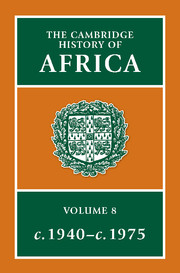Book contents
- Frontmatter
- Introduction
- 1 The Second World War: prelude to decolonisation in Africa
- 2 Decolonisation and the problems of independence
- 3 Pan-Africanism Since 1940
- 4 Social and cultural change
- 5 The economic evolution of developing Africa
- 6 Southern Africa
- 7 English-speaking West Africa
- 8 East and Central Africa
- 9 The Horn of Africa
- 10 Egypt, Libya and the Sudan
- 11 The Maghrib
- 12 French-speaking tropical Africa
- 13 Madagascar
- 14 Zaire, Rwanda and Burundi
- 15 Portuguese-speaking Africa
- Bibliographical essays
- Bibliography
- Index
- References
2 - Decolonisation and the problems of independence
Published online by Cambridge University Press: 28 March 2008
- Frontmatter
- Introduction
- 1 The Second World War: prelude to decolonisation in Africa
- 2 Decolonisation and the problems of independence
- 3 Pan-Africanism Since 1940
- 4 Social and cultural change
- 5 The economic evolution of developing Africa
- 6 Southern Africa
- 7 English-speaking West Africa
- 8 East and Central Africa
- 9 The Horn of Africa
- 10 Egypt, Libya and the Sudan
- 11 The Maghrib
- 12 French-speaking tropical Africa
- 13 Madagascar
- 14 Zaire, Rwanda and Burundi
- 15 Portuguese-speaking Africa
- Bibliographical essays
- Bibliography
- Index
- References
Summary
For millions of peoples in Africa – and those with liberal inclinations outside Africa – two decades of independence brought little but disillusionment. For the Africans, the nationalist agitations of the 1930s down to the mid-1950s promised a new era of political self-assertion and freedom from foreign imperialist domination. The vision of what was to come was well put by Kwame Nkrumah of Ghana when he said: ‘Seek ye first the political kingdom and everything else shall be added unto you.’ Independence was to be the millennium when the African, after decades of being exploited and oppressed, was to come into his own ‘inheritance’. To the liberals of Europe and North America, the nationalist rhetoric of freedom and equality was a reassertion of the ideals they had cherished and proclaimed. But after two decades of independence these hopes and ideals were replaced by despair as pluralist institutions were supplanted by military rule in many states and the promise of plenty gave way, if not to the increasing impoverishment of the masses, then most certainly to relative stagnation. For example, it has been estimated that the average African state grew less food per capita in 1968 than it had done in 1956, while the per capita gross domestic product at market prices stood in 1970 at $200, a figure which had changed little from what it had been a decade earlier.
- Type
- Chapter
- Information
- The Cambridge History of Africa , pp. 52 - 94Publisher: Cambridge University PressPrint publication year: 1984
References
- 10
- Cited by

